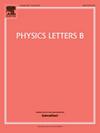ACT-ing on inflation: Implications of non bunch-Davies initial condition and reheating on single-field slow roll models
IF 4.5
2区 物理与天体物理
Q1 ASTRONOMY & ASTROPHYSICS
引用次数: 0
Abstract
We investigate a class of slow roll inflationary models in light of the recent Cosmic Microwave Background constraints from Planck 2018, ACT DR6, DESI DR1, and BICEP/Keck 2018. The combined dataset favors a higher value of the scalar spectral index , which places increased pressure on several conventional inflationary scenarios. In this study, we analyze the observational viability of various well-motivated models, including the -attractor E- and T-models, chaotic inflation, hilltop inflation, and natural inflation. We incorporate the effects of a post-inflationary phase of reheating and examine how the dynamics of reheating influence the predictions in the plane. We also impose a lower bound on the reheating temperature based on the constraint from the effective number of relativistic species () arising from primordial gravitational waves. While reheating improves agreement with observations for some models, significant regions of parameter space remain disfavored. Finally, we explore the impact of a non Bunch-Davies initial state and demonstrate that it can substantially improve the fit to the data across a broader class of inflationary models, thereby offering a potentially viable mechanism for reconciling theory with the latest observations.
对膨胀的作用:非束-戴维斯初始条件和再加热对单场慢滚模型的影响
我们根据最近来自普朗克2018、ACT DR6、DESI DR1和BICEP/Keck 2018的宇宙微波背景约束研究了一类慢滚动暴胀模型。综合数据集支持更高的标量光谱指数nS=0.9743±0.0034,这对几种传统的暴胀情景施加了更大的压力。在本研究中,我们分析了各种良好激励模型的观测可行性,包括α-吸引子E-和t -模型、混沌暴胀、山顶暴胀和自然暴胀。我们纳入了再加热后暴胀阶段的影响,并研究了再加热的动力学如何影响nS - r平面的预测。我们还根据由原始引力波产生的相对论性物质的有效数目(ΔNeff)的约束,对再加热温度施加了一个下界。虽然再加热改善了某些模式与观测值的一致性,但参数空间的重要区域仍然不理想。最后,我们探讨了非Bunch-Davies初始状态的影响,并证明它可以在更广泛的暴胀模型中大大提高对nS - r数据的拟合,从而为理论与最新观测相协调提供了一种潜在的可行机制。
本文章由计算机程序翻译,如有差异,请以英文原文为准。
求助全文
约1分钟内获得全文
求助全文
来源期刊

Physics Letters B
物理-物理:综合
CiteScore
9.10
自引率
6.80%
发文量
647
审稿时长
3 months
期刊介绍:
Physics Letters B ensures the rapid publication of important new results in particle physics, nuclear physics and cosmology. Specialized editors are responsible for contributions in experimental nuclear physics, theoretical nuclear physics, experimental high-energy physics, theoretical high-energy physics, and astrophysics.
 求助内容:
求助内容: 应助结果提醒方式:
应助结果提醒方式:


